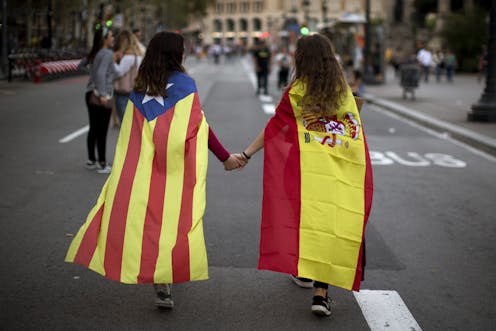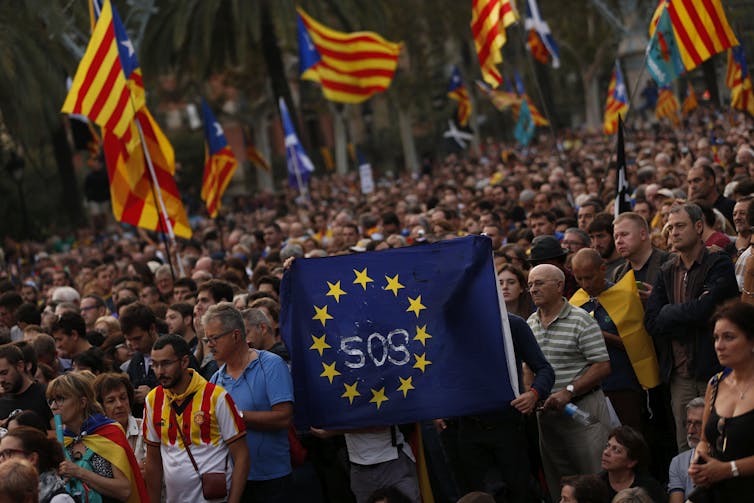Why the European Union's hands are tied over Catalonia
An expert explains why the EU is ill-equipped to handle a problem like Catalonia.

In recent weeks, the dispute over Catalonia’s quest for independence from Spain has captivated the attention of many parts of the world.
There is concern about further outbreaks of violence if the government in Madrid and the Catalonian independence movement cannot resolve their differences. This has led commentators to call for the European Union to step in and mediate. But such hopes are not well founded.
The EU has neither the tools nor the will to tackle the separatist crisis in Spain.
Here’s why.
Bad timing
First, the conflict over Catalonia’s status comes at a less than ideal time for the EU. Officials in Brussels are consumed with thorny negotiations over the United Kingdom’s withdrawal from the EU, the continuing flow of migrants to Europe, and challenges to the rule of law in Poland and Hungary, to name just a few issues. There is crisis fatigue in the EU and limited enthusiasm for trying to put out another fire.
A member state club
Second, the EU is not equipped, for legal and political reasons, to tackle separatist disputes like the one in Catalonia. As journalist Natalie Nougayrède points out, the EU cannot dictate how member states organize themselves or interact with their regions. Article 4.2 of the 2009 Lisbon Treaty, which revised the key constitutional treaties of the EU, states that the EU will not interfere with key state functions such as “territorial integrity” or “maintaining law and order.”

This means member states still largely dictate the policies of the EU and the member states have shown no willingness to back the Catalan separatists. This stems, in part, from a feeling of solidarity with the state of Spain. Some of the major powers in Europe are also distracted by major domestic challenges, be it Brexit for the United Kingdom, reforming the labor market in France or negotiating a new coalition government in Germany.
But ultimately, member states are worried about creating a precedent. Providing support for the independence movement in Catalonia, which is in open conflict with the Spanish government, could embolden other separatist forces across the continent, such as the Flemish in Belgium, the Corsicans in France or the Lombards in Italy.
In that sense, Kosovo provides a telling reminder of the general reticence toward secession movements among EU member states. Although it unilaterally declared independence nine years ago, five members of the EU – Spain, Slovakia, Greece, Romania and Cyprus – still refuse to this day to formally recognize the sovereignty of the Balkan country.
Limited mediation prospects
Third, even acting as a mediator in Catalonia’s dispute would be a stretch for the EU. This is not for a lack of experience or success. For example, in the Balkans, the EU managed to broker a major agreement in 2013, which allowed Serbia and Kosovo to normalize relations. It also intervened in the midst of a 2015 political crisis in Macedonia, following revelations that the government had illegally wiretapped many opposition figures. The 2015 Prižno agreement, mediated by the EU, proposed a roadmap to de-escalate the situation.
But, what worked in that one region cannot be easily applied to the Catalan case. While the major protagonists in the Balkans welcomed EU assistance, Spain regards the current dispute as a purely domestic matter. Whereas the EU had some leverage in the Balkans, either through its financial aid or the promise of potential membership, it lacks similar clout regarding Spain and Catalonia.
The EU would have little to offer the Catalan separatists to encourage them to compromise. The EU’s so-called “Prodi doctrine,” named after the former President of the European Commission, clarifies that any region breaking away from an EU member state would be automatically kicked out, and would then have to go through the lengthy application process to have a chance to rejoin.
Toothless on the rule of law
Fourth, focusing on the rule of law and upholding democratic norms could also prove challenging for the EU in this case. Certainly, some European leaders condemned the heavy-handed response of the Spanish police during the Oct. 1 vote in Catalonia, which left hundreds injured. But EU officials equally highlighted that the referendum was clearly illegal, not in line with good referendum practices and in violation of the Spanish constitution.
Moreover, there is no sign currently that the EU is considering punishing the Spanish government for its use of force in reaction to the vote. But even if the situation worsened, and Spain once again resorted to excessive force, the EU lacks effective tools to hold member states accountable for not living by fundamental democratic values. As scholars Heather Grabbe and Stefan Lehne explain, member states are reluctant to allow too much oversight from the EU when it comes to monitoring the rule of law.
Article 7 of the 2009 Lisbon Treaty lists possible sanctions that the EU could pursue if a member state does not respect key values. These include suspending a country’s voting rights. But Article 7 requires a high threshold of support among member states for its activation and implementation. Indeed, you need the support of at least 80 percent of the member states, as well as the consent of the European Parliament, to even officially determine that a country may be at risk of breaching key EU values. It is no surprise then that Article 7 has not been used to this day.
This is not to say that the EU should stay on the sidelines. Offering informal mediation advice, keeping in close contact with the Spanish government and the Catalan separatists, and constantly calling for a peaceful solution to this dispute, would not hurt. But, the key to a long-term solution, whether amendments to the Spanish constitution that would allow referendums or strengthening Spain’s Senate as a representative of the country’s regions, rests with the Spanish actors. The EU has enough on its plate as it is.
Garret Martin does not work for, consult, own shares in or receive funding from any company or organization that would benefit from this article, and has disclosed no relevant affiliations beyond their academic appointment.
Read These Next
Drug company ads are easy to blame for misleading patients and raising costs, but research shows the
Officials and policymakers say direct-to-consumer drug advertising encourages patients to seek treatments…
Tiny recording backpacks reveal bats’ surprising hunting strategy
By listening in on their nightly hunts, scientists discovered that small, fringe-lipped bats are unexpectedly…
How the Seattle Seahawks’ sale will score a touchdown for charity 8 years after Paul Allen’s death
Selling a sports team is much more complicated than selling assets found in a typical estate, such as…





